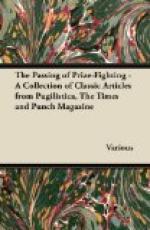* * * * *
Chief among the Secrets of Crewe House (HODDER AND STOUGHTON), now divulged to the mere public, are the marvellous efficiency and superhuman success achieved by the British Enemy Propaganda Committee, which operated in Lord CREWE’S London house under the directorate of Lord NORTHCLIFFE. “What is propaganda?” the author asks himself on an early page, and the right answer could have been made in four letters: ADVT. It is endorsed by the eulogistic manner in which the Committee’s work is written up by one of them, Sir CAMPBELL STUART, K.B.E., and illustrated by photographs of Lord NORTHCLIFFE (looking positively Napoleonic) and of the sub-supermen. As in all great achievements, the main principle was a simple one. A good article is best advertised by truth; and it was the truth, the whole truth and nothing but the truth which the Committee, with admirable conciseness and no little ingenuity, so promulgated that it could no longer escape notice even in the Central Empires. Not the least of the Committee’s difficulties and achievements was to get the truth of our cause and policy so defined as to be susceptible of unequivocal statement by poster, leaflet, film and gramophone record. Sir CAMPBELL STUART perhaps tends to underrate the rival show, the German propaganda organization, whose work, if it did Germany little good, has done and is still doing colossal harm to us. Also he tends to forget that Lord HAIG and his little lot in France at any rate helped the Committee to effect the breakdown of the German moral in 1918 and so to win the war.
* * * * *
I feel that Miss MARGARET SYMONDS had a purpose in writing A Child of the Alps (FISHER UNWIN), but, unless it was to show how mistaken it is, as Basil, the Swiss farmer, puts it, “to think when thou shouldst have been living,” it has evaded me. The book begins with a romantic marriage between an Englishwoman of some breeding and a Swiss peasant who is a doctor, and tells the history of their daughter until she is about to marry Basil, her original sweetheart. I cannot be more definite or tell you how her first marriage—with an English cousin—turned out, because Linda’s own account of this is all we get, and that is somewhat vague. A great many descriptions of beautiful scenery, Swiss and Italian, come into the book, and a great many people, some of them very individual and lifelike; but the author’s concentration on Linda gives them, people and scenery alike, an unreal and irritating effect of having been called into being solely to influence her heroine, and that lessens their fascination. Yet it is a book which makes a distinct impression, and once read will not easily be forgotten. It seems a strange comment to make on a new volume of a “First Novel Library,” but A Child of the Alps, as you will realise if you have been reading novels long enough, is almost exactly the sort of book its title would have suggested had it appeared thirty years ago.




